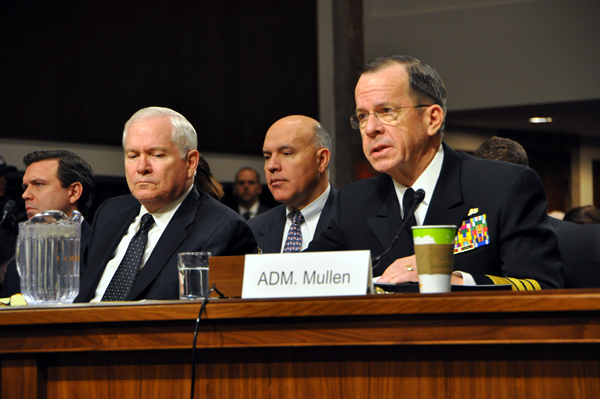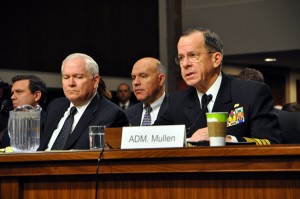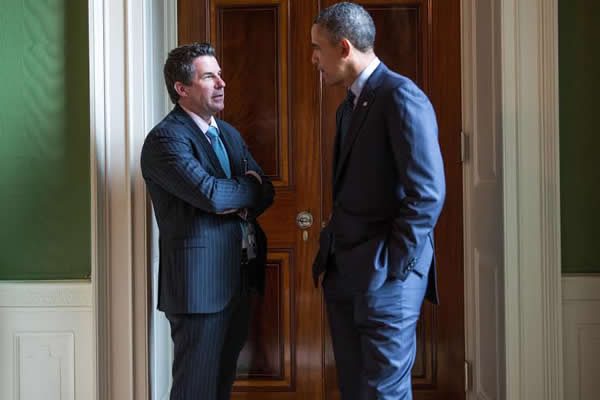National
Pentagon working with gay groups on ‘Don’t Ask’ review
Defense officials seek advice, are ‘open and inclusive’

Gay organizations working to end “Don’t Ask, Don’t Tell” are enjoying an open relationship with the Pentagon working group reviewing the law as they continue to express concerns about the study deviating from its purpose.
Defense Secretary Robert Gates and Chairman of the Joint Chiefs of Staff Adm. Michael Mullen established the working group following a Feb. 2 hearing on Capitol Hill as a way to examine how to implement an end to “Don’t Ask, Don’t Tell,” should Congress repeal the law. The work is expected to be completed Dec. 1.
Alex Nicholson, executive director of Servicemembers United, said his organization has had a positive engagement with the working group since its inception.
“They brought us in — in the very beginning — to initially brief us on what they were planning to do, to answer any questions we had,” he said. “They were very open and inclusive, but not only to us. They were that way with our opposition as well.”
In one such conversation, Nicholson said the working group held a conference call to answer questions about the new regulations that were instituted last month to relax the implementation of “Don’t Ask, Don’t Tell.”
“There was a little bit of a worry, I think, in the beginning that maybe them bringing us in, being so open in answering questions, was a one-time, token gesture,” Nicholson said. “I’m pleased to say now it’s my impression that those worries, at least so far, have been unfounded. The working group has a primary point of contact for us within the Department of Defense, and that point of contact has been extremely open and extremely available.”
Nicholson said Servicemembers United first spoke with someone at the working group to express concern about the group’s mandate and noted it would set a bad precedent to poll the force on potential policy changes.
“The working group responded to that by telling us that the terms of reference have been issued, they are what they are and they don’t have control over them,” he said.
In a second round of suggestions, Nicholson said Servicemembers United passed along some ideas for the methodology the working group could institute to examine how to implement repeal. Some of the recommendations, he noted, were to advise against town hall meetings and focus groups to poll the force.
“Focus groups are a bad idea because of the phenomena of group think and posturing,” he said. “On any perceived controversial issue, you’re going to get a much a different set of answers if you ask people about it in a group rather than asking them one on one.”
Aubrey Sarvis, executive director of the Servicemembers Legal Defense Network, also said his organization’s staff have had weekly conversations and meetings with the working group.
“I think it’s been positive, ongoing,” he said. “It’s not a process that we asked for, or that we think is needed, but we’re dealing with the reality that it’s in place and we’re going to do everything that we can to make it work and have a positive contribution.”
In these conversations, Sarvis said SLDN has been recommending voices and organizations that work to end the ban on open service.
Another organization that has engaged with the working group is the Palm Center, a think tank on gays in the military at the University of California, Santa Barbara. Nathaniel Frank, a Palm Center research fellow, said he’s had a “good relationship” with the Pentagon working group.
“They’ve reached out to us consistently and they’ve been responsive to us and I’m impressed by that,” he said. “The question will be, obviously, what are the results of the study and how are they expressed. So that proof will be in the pudding.”
Frank said the working group has asked the Palm Center to make recommendations on a litany of issues, including how to identify the costs to the military of “Don’t Ask, Don’t Tell.”
“That doesn’t mean just financial costs,” he said. “It means a litany of costs to morale, recruitment, cohesion, the impact on GLB service members, and Palm is coming out with a memo that I’m finalizing now that tries to convey all of those costs.”
Frank said the working group also asked about the pitfalls of using focus groups; how to measure the views of military families; and how to empirically assess the impact of lifting the ban on unit cohesion.
Another item that Frank said he was asked about was getting the views of gay service members for the study without putting them at risk for discharge under “Don’t Ask, Don’t Tell.”
This challenge has been repeatedly discussed in hearings on Capitol Hill and among those seeking repeal. In a statement released last week, Army Secretary John McHugh said the Pentagon is “likely” to employ a third party to solicit those views.
Sarvis said his understanding is the Pentagon is considering the use of a professional consultant or pollsters who have worked with the Pentagon before on manpower issues.
“In addition, I think they’re also looking to the RAND Corp. as part of that engagement,” he said.
But the decision on how the Defense Department will obtain these views is apparently not yet final. Cynthia Smith, a Pentagon spokesperson, said in a statement to DC Agenda on April 9 that the working group is still considering the best way to incorporate gay service members into the study.
“Getting the views of gay and lesbian service members is very important to the working group,” she said. “We are still in the process of developing the proper instrument to obtain this information from gay and lesbian service members currently serving.”
Frank said he would take issue with any decision from the Pentagon to use a third party to solicit the views of gay service members because it would create a situation where service members generally would speak to one group, and gay, lesbian and bisexual service members would talk to another.
“Uniform personnel … would be consulting service members generally and then they would employ civilians or a third party only to speak to known gays and lesbians,” he said. “There’s an unfairness there in having the military speak directly to straight service members and not to gay service members.”
A better solution, Frank said, would be for the Pentagon to issue new regulations that would enable all service members to speak to the working group without fear of being discharged under “Don’t Ask, Don’t Tell.”
“The only consistent way to do it is to apply that uniformly to all people and not have separate standards, which is obviously the problem with the policy as it is,” he said.
Even with the openness between these groups and Pentagon officials, some repeal advocates say they have concerns about the working group’s direction.
Gates has repeatedly said the purpose of the group will be to examine how to implement an end to the ban should Congress repeal the law during the Senate hearing in February. But some repeal advocates say there’s a lack of clarity.
Nicholson said he has “big concerns” about the direction the group is heading, recalling testimony that Jeh Johnson, head of the Pentagon’s Office of General Counsel and co-chair of the group, gave before the House in March in which the results of the working group would inform how Congress would proceed on the issue.
“And that, I think, was very dangerous and was a new twist,” he said. “If the mission of the working group is to simply come up with an effective implementation management plan for after repeal takes effect, then there really should be no reason why Congress should need to wait for the outcome of the working group.”
Frank also acknowledged “some confusion” about whether the purpose of the working group is to study how to lift the ban or whether to lift the ban.
“I think the reason for that confusion is while the group says it’s studying how to lift the ban, given the strategic intention of the president, whether the ban is actually lifted is in the hands of the Congress,” Frank said. “So if the group comes out with a study that exaggerates the risks to cohesion, or other risks associated with lifting the ban, obviously, that will make it easier for obstructionists in Congress to try to block repeal.”
Frank called on leaders handling the group to “make it more clear that they are assessing how best to lift the ban” and note that the only reason they’re evaluating repeal is to determine how to mitigate any harm.
“It’s important to say that years and years of research across the board make clear that that impact will be negligible or non-existent, and most of us already know that,” he said.
Nicholson was particularly critical of the White House and said he thinks it’s “extremely concerning” President Obama hasn’t come out and clarified the study’s purpose. Nicholson noted that he’s been asking for clarification from the White House for several weeks now and hasn’t received a response.
“I just felt like with the working group, they’ve been very much great in communicating with us, been very receptive, I do get the impression that they’re honestly considering the suggestions we give to them,” he said. “The White House, on the other hand, it’s felt like we’ve been throwing suggestions down a black hole.”
Nicholson said he doesn’t think that White House officials are seriously considering his organization’s input and that “they ignore a lot of us for weeks at a time sometimes.”
“Unfortunately, the White House is not only not listening to or considering our suggestions and communicating with us, but they haven’t given any indication that they intend to clarify the position of the working group or curtail the expansion of its scope,” he said.
Shin Inouye, a White House spokesperson, disputed the notion that the White House wasn’t engaged with the Servicemembers United.
“The White House is actively engaged with Servicemembers United and other groups on many issues of interest to the LGBT community, including ‘Don’t Ask, Don’t Tell,'” he said in a statement.
But Sarvis said he thinks the group will stay on track with its mission as long as it adheres to its mandate and stays focused on implementing open service.
“If they move away from their mandate, if they get into polling on if or whether, or seeking the personal opinions of service members, then, yes,” he said, “I think we have a problem.”
The White House
As house Democrats release Epstein photos, Garcia continues to demand DOJ transparency
Blade this week sat down with gay House Oversight Committee ranking member

Democrats on the House Oversight Committee have released new photos from Jeffrey Epstein’s email and computer records, including images highlighting the relationship between President Donald Trump and the convicted sex offender.
Epstein, a wealthy financier, was found guilty of procuring a child for prostitution and sex trafficking, serving a 13-month prison sentence in 2008. At the time of his death in prison under mysterious circumstances, he was facing charges of sex trafficking and conspiracy to traffic minors.
Among those pictured in Epstein’s digital files are Trump, former President Bill Clinton, former Trump adviser Steve Bannon, actor and director Woody Allen, economist Larry Summers, lawyer Alan Dershowitz, entrepreneurs Richard Branson and Bill Gates, and Andrew Mountbatten-Windsor.
One photo shows Trump alongside Epstein and a woman at a Victoria’s Secret party in New York in 1997. American media outlets have published the image, while Getty Images identified the woman as model Ingrid Seynhaeve.
Oversight Committee Democrats are reviewing the full set of photos and plan to release additional images to the public in the coming days and weeks, emphasizing their commitment to protecting survivors’ identities.
With just a week left for the Justice Department to publish all files related to Epstein following the passage of the Epstein Files Transparency Act, which requires the Justice Department to release most records connected to Epstein investigations, the Washington Blade sat down with U.S. Rep. Robert Garcia (D-Calif.), the ranking member on the Oversight Committee to discuss the current push the release of more documents.
Garcia highlighted the committee’s commitment to transparency and accountability.

“We’ve said anything that we get we’re going to put out. We don’t care who is in the files … if you’ve harmed women and girls, then we’ve got to hold you accountable.”
He noted ongoing questions surrounding Trump’s relationship with Epstein, given their long history and the apparent break in friendship once Trump assumed public office.
“There’s been a lot of questions about … Donald Trump and Jeffrey Epstein. They were best friends for 10 years … met women there and girls.”
Prior to Trump’s presidency, it was widely reported that the two were friends who visited each other’s properties regularly. Additional reporting shows they socialized frequently throughout the 1990s and early 2000s, attending parties at Trump’s Mar-a-Lago resort in Florida and Epstein’s residences. Flight logs from an associate’s trial indicate Trump flew on Epstein’s private jet multiple times, and Epstein claimed Trump first had sex with his future wife, Melania Knauss, aboard the jet.
“We’ve provided evidence … [that leads to] questions about what the relationship was like between Donald Trump and Jeffrey Epstein.”
Garcia stressed the need for answers regarding the White House’s role in withholding information, questioning the sudden change in attitude toward releasing the files given Trump’s campaign promises.
“Why is the White House trying to cover this up? So if he’s not covering for himself … he’s covering up for his rich friends,” Garcia said. “Why the cover up? Who are you hiding for? I think that’s the question.”
He confirmed that Trump is definitively in the Epstein files, though the extent remains unknown, but will be uncovered soon.
“We know that Trump’s in them. Yeah, he’s been told. We know that Trump’s in them in some way. As far as the extent of it … we don’t know.”
Garcia emphasized accountability for all powerful figures implicated, regardless of financial status, political party, or personal connections.
“All these powerful men that are walking around right now … after abusing, in some cases, 14‑ and 15‑year‑old girls, they have to be held accountable,” he said. “There has to be justice for those survivors and the American public deserves the truth about who was involved in that.”
He added that while he is the ranking member, he will ensure the oversight committee will use all available political tools, including subpoenas — potentially even for the president.
“We want to subpoena anyone that we can … everyone’s kind of on the table.”
He also emphasized accountability for all powerful figures implicated, regardless of financial status, political party, or relationship with the president.
“For me, they’re about justice and doing the right thing,” Garcia said. “This is about women who … were girls and children when they were being abused, trafficked, in some cases, raped. And these women deserve justice.”
“The survivors are strong.”
Deputy White House Press Secretary Abigail Jackson issued a statement regarding the release the photos, echoing previous comments from Republicans on the timing and framing of the photos by the Oversight Committee.
“Once again, House Democrats are selectively releasing cherry-picked photos with random redactions to try and create a false narrative,” Jackson said.
“The Democrat hoax against President Trump has been repeatedly debunked and the Trump administration has done more for Epstein’s victims than Democrats ever have by repeatedly calling for transparency, releasing thousands of pages of documents, and calling for further investigations into Epstein’s Democrat friends,”
In a press release on Friday, Garcia called for immediate DOJ action:
“It is time to end this White House cover-up and bring justice to the survivors of Jeffrey Epstein and his powerful friends. These disturbing photos raise even more questions about Epstein and his relationships with some of the most powerful men in the world. We will not rest until the American people get the truth. The Department of Justice must release all the files, NOW.”





(Photo courtesy of the U.S. House Oversight Committee)
The White House
White House deadnames highest-ranking transgender official
Rachel Levine’s portrait altered at HHS

Admiral Rachel Levine — the first transgender person ever confirmed by the U.S. Senate and the highest-ranking trans official in American history — had her official portrait in the Humphrey Building altered, with staff replacing her correct name with her deadname, the name she has not used since 2011.
NPR first reported the change, and an HHS spokesperson confirmed to the outlet that Levine’s portrait had recently been altered. A digital photograph obtained by NPR shows Levine’s former (male) name typed on a placard beneath the portrait, placed under the glass of the frame.
Levine served as a four-star admiral in the U.S. Public Health Service Commissioned Corps under the Biden-Harris administration and was appointed the 17th assistant secretary for health.
During her tenure, Levine oversaw the Commissioned Corps and helped lead national public-health initiatives, including the federal COVID-19 response and vaccination strategy; efforts to address rising syphilis infection rates; HIV/AIDS prevention and treatment programs; and strategies to combat the opioid epidemic, particularly through expanded harm-reduction approaches for the communities most affected.
The Trump-Vance administration’s decision to publicly deadname Levine is widely viewed within the trans community as demeaning and disrespectful. The move comes amid a series of federal policy reversals targeting LGBTQ Americans, particularly trans youth seeking gender-affirming care.
Those actions include: weakening workplace protections for LGBTQ employees; limiting restroom access; downgrading gender-identity discrimination cases; pressuring hospitals to end gender-affirming care; cutting HIV research and prevention funding; removing LGBTQ crisis resources; restricting access to trans-inclusive medical policies for veterans and young people; supporting trans sports bans and threatening funding for teams that include trans athletes; and forcing schools and universities to eliminate DEI and LGBTQ offices, inclusive curricula, gender-neutral bathrooms, and books or training materials addressing LGBTQ issues.
The Trump–Vance administration has also expanded federal censorship by removing LGBTQ language from surveys, agency websites, Smithsonian materials, and human-rights reports; blocking Pride recognitions; creating federal communications that misgender trans women; imposing passport and travel barriers for trans Americans; lifting protections for trans service members; limiting benefits and care for LGBTQ veterans; and pressuring states, universities, and hospitals to end trans-inclusive policies under threat of losing federal research, education, or Medicaid funds. The administration has additionally deported LGBTQ asylum seekers to unsafe conditions, removed LGBTQ issues from global human-rights reporting, and escalated anti-trans rhetoric at public events.
These actions stand in stark contrast to Levine’s public-health record. As assistant secretary for health, she worked to expand LGBTQ+ health data collection, promote equitable vaccine distribution, strengthen national health-equity initiatives, and reduce care disparities experienced by historically underserved communities, including LGBTQ populations. Within HHS, she led councils and task forces dedicated to reducing structural barriers to care and improving community outcomes.
Before joining the federal government, Levine oversaw health and safety for nearly 13 million residents as Pennsylvania’s physician general from 2015–2017 and as Pennsylvania secretary of health from 2018–2021.

Asked by NPR about the alteration of her official portrait, Levine responded that it had been an honor to serve as assistant secretary for health, adding: “I’m not going to comment on this type of petty action.”
Health
The harsh truth about HIV phobia in gay dating
HIV and stigma remain baked into queer dating culture

Uncloseted Media published this article on Dec. 9.
This story was produced with the support of MISTR, a telehealth platform offering free online access to PrEP, DoxyPEP, STI testing, Hepatitis C testing and treatment and long-term HIV care across the U.S. MISTR did not have any editorial input into the content of this story.
By SAM DONNDELINGER | In his room, 19-year-old Cody Nester toggles between Grindr profiles on his phone.
As he senses chemistry with a match, he knows he has to flag something that could be a deal breaker.
“Did you see on my profile that I’m HIV positive?” he writes.
The reply arrives instantly.
“You’re disgusting. I don’t know why you’re on here.” Seconds later, the profile disappears, suggesting Nester is blocked.
“He went out of his way to say that. People could at least be more aware, ask questions, and understand the reality [of living with HIV] instead of attacking us,” Nester told Uncloseted Media.
“I would say 95 percent of people respond that way,” says Nester, who lives in Hollywood, Fla., and works at a Mexican restaurant. “The entire conversation is going fine. They’re down to meet up and then right when I mention [HIV], it’s always, ‘Oh no, never mind.’”
Some other messages he’s received include:
“You’ll never get anything in your life.”
“Why don’t you die?”
“Why are you on here?”
More often, it’s silence, a cold “No” or a sudden block.
“It’s like you’re a white fish in a school of black fish,” he says. “You’re immediately the odd one out.”
Even though Nester’s undetectable status makes it impossible for him to transmit HIV to partners during sex, he experiences stigma around HIV, something which nearly 90 percent of Americans agree still exists, according to a 2022 GLAAD report. And a survey shared in 2019 found that 64 percent of respondents would feel uncomfortable having sex with someone living with HIV, even on effective treatment. The emotional cost of this stigma is a significant barrier to intimacy and can result in a loss of self-esteem, fear of disclosure and suicidal thoughts.
What the science says — and why it doesn’t seem to matter
“The fear comes from antiquated ideas around HIV,” says Xavier A. Erguera, senior clinical research coordinator at University of California, San Francisco,’s Division of HIV, Infectious Diseases & Global Medicine. “A lot of people who are newly diagnosed still fear it’s a death sentence. Even though we have medications now to treat it effectively, and it’s basically a chronic condition, people haven’t caught up.”
Since 1996, antiretroviral therapies have developed to where they can suppress the virus to levels so low that it is undetectable in the blood, and thus not able to be transmitted to sexual partners. This is known as Undetectable = Untransmittable, or U=U. According to a Centers for Disease Control and Prevention report from 2024, 65 percent of HIV-positive cases are virally suppressed.
Another line of defense is pre-exposure prophylaxis (PrEP), which reduces the risk of acquiring HIV from sexual intercourse by roughly 99 percent when taken as prescribed. Approved by the Food and Drug Administration in 2012, the medication launched as a once-a-day pill and was hailed as a breakthrough as it transformed the sex lives of gay men, which had been shaped by decades of fear about HIV complications and about where AIDS came from.
“Internal logic doesn’t reflect what we know scientifically,” says Kim Koester, associate professor in the Department of Medicine at UCSF. “I was very optimistic when PrEP came out. The drug works, so why wouldn’t everyone use it?”
Even with PrEP use on the rise, less than 600,000 Americans used it in 2024, and Koester says skepticism and judgments about taking the drug persist.
“The phobia is pervasive,” Koester told Uncloseted Media. “People believe that others get the disease because of their lifestyle. … PrEP was supposed to be the antidote to the threat of HIV, reduce the anxiety, and make you more open to who you are and the sex you want. It’s supposed to be liberating. It is part of the answer. But it’s not enough. We don’t have enough people using PrEP for it to make the dent in the stigma we need.”
According to a 2023 study of seven informants living with HIV, public stigma stems from problematic views from society that those living with HIV are “a dangerous transmission source,” “disgraceful” and “violators of social and religious norms who have committed deviant behavior.”
Laramie Smith, assistant professor of Global Public Health at the University of California, San Diego, says this stigma is unwarranted and fueled by misunderstanding:
“With today’s treatments, it shouldn’t be a life-altering identity shift. It should be no different than, ‘I have diabetes.’ If you’re virally suppressed, it shouldn’t matter whether you’re friends with someone, whether you’re sleeping with someone — the science shows us that.”
How HIV phobia shows up online
Nester, who contracted HIV last year from a Grindr hook-up who insisted he was negative, says he is just starting to accept his diagnosis. “I didn’t go back on the apps for a long time after that. It messed with my mental health … realizing I’d have to take medication for the rest of my life.”
Since he started dating again this year, returning to apps like Grindr and Sniffies, he has faced a new normal. He tries to do everything “right” and disclose his status early. Even on his Grindr profile, he identifies as “poz,” slang for HIV-positive.
Still, he says most people ghost him once they find out. “The second I bring it up, it’s ‘No,’” says Nester. “The amount of discrimination you get … it’s always the same pattern. … People don’t know, and they don’t want to know. It messes with you.”
This discrimination may be fueled by a deprioritization of HIV awareness programs across the country. Earlier this month, the U.S. State Department did not commemorate World AIDS Day for the first time in 37 years. HIV prevention programs have been slashed, especially in conservative districts, and only 25 states and D.C. require both HIV and sex education. In many states, health curricula often lag behind current science and omit teaching about PrEP, gay sex and concepts like U=U. Research shows that Gen Z is currently the least educated generation about HIV.
“I could go all day explaining HIV, but people don’t want to listen,” says Nester, who is part of Gen Z. “People don’t want to learn about it; they just want to avoid it.”
HIV anxiety and public stigma shaped by history
Even in more progressive areas, stigma still exists. Damian Jack, a 45-year-old from Brooklyn, remembers sitting in an exam room in 2009 as a doctor explained how low his T-cell count was, which is a hallmark of HIV infection.
“I started hysterically crying,” he told Uncloseted Media. “HIV meant death. That’s what I thought.”
In 1981, when Jack was 1 year old, the first reports of a mysterious and deadly immune deficiency syndrome, which would later be named AIDS, appeared in the U.S. Growing up, Jack saw countless terrifying images of men on their deathbeds with Kaposi sarcoma, the purple lesions the media once called “gay cancer.” Public misinformation and fearmongering spread ideas that AIDS was a disease that “only gay men and drug users get.” And politicians often equated it with homosexuality and moral failure, calling it a “gay plague.” It wasn’t until September 1985, four years after the crisis began and thousands had died, that President Ronald Reagan first publicly mentioned AIDS.
Decades later, the emotional residue of that era and the shame associated with the virus lingers.
Hours after learning of his diagnosis, Jack faced his first encounter with rejection. He already had a date planned that night, and his doctor and friends encouraged him to go.
They had a great time until the date asked him: “Are you negative or positive?”
He told the truth.
“It was just understood there wouldn’t be a second date,” says Jack. “I remember thinking, ‘This is how dating is going to be now.’ I felt so anxious telling guys. It followed me everywhere. I don’t think that anxiety ever truly goes away.”
The emotional impact of HIV stigma
For those who are HIV-negative, experts say that “stigma’s whole design is to ‘other.’”
“The ‘us versus them’ creates that false sense of safety when it comes to HIV,” says Smith. “If I can believe that someone did something to deserve their diagnosis, and I’m not that [kind of person], then I’m safe.”
This othering is painful and can lead to shame, fear and isolation, and it is linked to a higher risk of depression and anxiety.
“If I’m undesirable, and that’s what those messages are communicating, that threatens your sense of safety, your sense of belonging and the fundamental desire we all have to be loved,” Smith says. “And that starts to reinforce the thinking that ‘I am not worthy. This virus that I have means that I’m not lovable. I am not safe showing up among other men.’”
“I pretend it doesn’t hurt, but some things do sting a little bit,” Nester says. “You start thinking, ‘Am I really that disgusting? Am I really that singled out?’”
When public stigma turns inward
“Internalized stigma is what occurs when applying the stereotypes about who gets HIV, the prejudice, the negative feelings, onto yourself,” says Smith.
In 2024, 38 percent of people living with HIV reported internalized stigma. And studies show that it can predict hopelessness and lower quality of life, even when people are engaged in care or virally suppressed.
Internalized stigma can also affect how people practice safe sex and communicate about the virus. A 2019 survey of men who have sex with men found that individuals who perceived greater community-level stigma were less likely to be aware of — and use — safer-sex functions available on dating apps, such as HIV-status disclosure fields, as well as sexual health information and resources.
“[HIV phobia] is probably the most intense, subvert bigotry I think you could experience,” Joseph Monroe Jr., a 48-year-old living in the Bronx, told Uncloseted Media.
On dating apps, men have messaged him things like, “You look like you’ve got that thing” and “Go ahead and infect someone else.”
Monroe has also dealt with misinformed people who rudely opine about how he contracted the virus: “Who fucked you? That’s how you got it, right?” people will say to him.
“You end up internalizing all these stereotypes about who gets HIV — that you were promiscuous, that you didn’t care about yourself, that you did something wrong,” says Smith. “You carry that in, and then you have to relearn: ‘No, I didn’t. This is just a health condition.’”
What HIV acceptance looks like and raising awareness
For those living with HIV, acceptance feels far away.
“You’re living under this threat of HIV and the threat that others find you threatening. It inhabits you socially and sexually,” Koester says. “People are hunkering down. Not putting themselves out there and having a mediocre quality of life. To have a sense of empowerment, you have to be legitimate and seen in the world and it’s hard to do that with the stigma that exists.”
Researchers say the path forward lies as much in conversation as in medicine.
Koester says she talks about HIV and PrEP anywhere she can, including in salons, cafes and restaurants. “Whenever I get into a cab with someone, I’m going to bring up HIV so the driver gets accustomed to hearing about it. … We have a long way to go in terms of exposure and awareness and every little bit helps.”
Part of this lies in increasing awareness through targeted marketing campaigns. PrEP is still profoundly misunderstood outside major urban centers, with uneven uptake among minority groups and usage gaps in the Bible Belt. And a 2022 U.S. survey found that 54.5 percent of people living with HIV didn’t know what U=U meant, and less than half of Americans agree that people living with HIV who are on proper medications cannot transmit the virus.
While eradicating stigma is slow, there is hope for acceptance.
Years after Jack’s diagnosis, in 2021, he told a man he was on a third date with that he was HIV-positive but undetectable. His date’s reply was almost casual:
“Oh — is that it? I thought you were going to say you had a boyfriend or something. I’m on PrEP. You’re fine.”
“It felt so good to hear him say that and accept me,” says Jack. “I was like, ‘This is my person. You’re my person.’” One year later, they got married.
Back in Florida, 19-year-old Cody Nester isn’t feeling this acceptance. He still scrolls past profiles that read “Only negative guys” and tries to ignore the hateful messages.
“It still hurts, but I know it’s coming from fear,” he says. “I wasn’t too informed about HIV before I got it. … When I got it, I really jumped into the rabbit hole and began to learn. I really do think [HIV and stigma] is because people are not knowledgeable. … When people don’t know details, they tend to get scared.”
Additional reporting by Nandika Chatterjee.




















